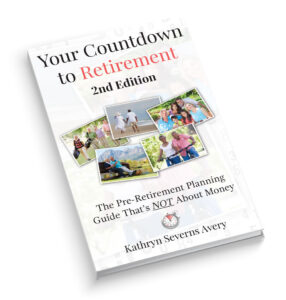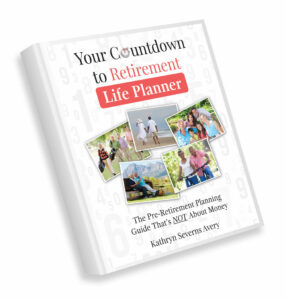It's Not Just About the Money!
Retirement: One Word, Many Meanings
-
Author : Your Countdown to Retirement
Date : April 1, 2016
Category : Redefining Retirement
Comments : 0
Like : 0

While my husband and I were at dinner the other night with two other couples, the conversation turned to the topic of retirement. The three men at the table had not yet retired but had three completely different ideas about what they wanted in the next phase of their lives.
They were:
- Retirement without Working
- Retirement with a Transition Period of Working/Consulting Part-Time
- Retirement with Launching a New Career/Business
Each man’s idea of retirement is what is right for him, yet the three scenarios will require different mindsets, resources, and support structures to be successful.
The wives at dinner were in different phases of retirement. One had already retired and was no longer working in her former career. One was planning to continue working for five or more years and was enthusiastic about the
possibly expanding her business. The other, me, was planning to continue her existing line of work while launching a new business with her husband.
The wives at dinner were in different phases of retirement. One had already retired and was no longer working in her former career. One was planning to continue working for five or more years and was enthusiastic about the possibly expanding her business. The other, me, was planning to continue her existing line of work while launching a new business with her husband.
The relationships dynamics of all three couples are being impacted by their choices. For example, one couple disagreed about when the husband should retire. He wants to leave his works in a few years. She prefers him to work for five more years.
“The thought of being the primary bread winner for five years is frightening to me,” she said. “I also realize that I may feel jealous of his free time because I’m working and he’s off doing what he wants to do,” she continued.
The couple at dinner where one spouse has retired but the other is still working seemed to be enjoying their arrangement. Thus far, they have successfully navigated the danger of the working spouse resenting the retired spouse’s free time and the converse of the situation where the retired spouse resents lack of time with the working spouse.
To say that couples approaching retirement have a myriad of complex issues to work through is an understatement. In talking with others couples approaching retirement a common theme came to light: unspoken, unexamined, and unrecognized fears surfacing and creating irritability, conflicts, and even depression.
A spouse may not be able to articulate the source of their fear and anxiety. Yet they know something is bothering them. It may take time to identify the source of the fear leaving the spouse at a loss as to why their partner is moody or feeling depressed. Further impacting the situation are anxious feelings about sharing that newly identified fear with their spouse because they are concerned about being perceived as weak, inadequate, vulnerable, or indecisive. We will deal with strategies to work through these fears in another post.
Here are some tips to help you as you begin to explore your countdown to retirement:
Creative Thinking without Critical Thinking.
Spend time listing the ideas and ideals of retirement activities (with or without pay) without saying why they won’t work. Prioritize those “dream retirement” elements and look for clues as to satisfying pursuits once you leave your job. My husband and I used poster board and made a “map” of our ideal retirement. Ideas flowed and patterns of possibilities began to emerge.
Research Your Options
The type of retirement you want will guide your research. Not planning to work? Travel, volunteering and education may be your areas of research. Those who want to work part-time or consult can begin investigating those options while still in the workplace. Others who want to change careers or start a business may find it less stressful to research jobs or how to start a new business while they are still working. In all cases, knowing what you’re retiring to is critical.
Develop a Plan
If you are married or in a relationship, make sure the plan is mutually agreeable. This process should excite you as you map out your future. If you would like additional information and tools for this process click here.
Open Up Communication
Good communication skills are imperative to successfully transitioning to retirement. There are many areas that require negotiation and compromise. It may be necessary to enlist the help of a professional if lines of communication have broken down.







